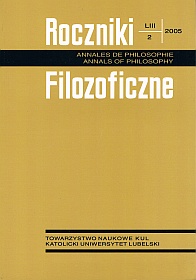On Incomplete Induction in Mathematics
Abstract
The subject of this article is the role of inductive reasoning (in the meaning of induction by incomplete enumeration) in the methodology of mathematics.
The following types of induction have been distinguished:
I1) induction which causes formulation of axioms of different mathematical theories;
I2) enumerative induction which causes formulation of theorems on the basis of a finite number of cases;
I3) induction concerning the range of application of mathematical symbols;
I4) induction generalising the properties of finite sets to the infinite case;
I5) induction pointing to analogies between problems belonging to different domains of mathematics.
Inductive reasoning should not be put against the creativity of scientists, as induction is often an important, though not always conscious part of our cognition. The concept of notional metaphor can be useful for explaining the nature of inductive reasoning. With this concept, a general scheme of inductive reasoning has been proposed, which, in the opinion of the authors, is more adequate for presenting the nature of induction than traditional approaches.
References
Aaboe A.: Matematyka w starożytności, Warszawa: PWN 1968.
Batóg T.: Dwa paradygmaty matematyki. Studium z dziejów i filozofii matematyki, Poznań: Wydawnictwo Naukowe UAM 1996.
Black M.: Self-Supporting Inductive Arguments, [w:] The Philosophy of Science, ed. P. H. Nidditch, Oxford: Oxford University Press 1968, s. 136-143.
Bobrowski D.: O pewnych koncepcjach probabilistycznych Jakuba Bernoulliego, [w:] Probabilistyka i mechanika w szkicach historycznych. Materiały z V Ogólnopolskiej Szkoły Historii Matematyki, cz. I. (red. S. Fudali), Szczecin 1992, s. 1-8.
Bocheński J. M.: Współczesne metody myślenia, Poznań: W drodze 1992.
Cantor G.: Gesammelte Abhandlungen, Hildesheim: Georg Olms Verlagsbuchhandlung 1962.
Chmielewski A.: Filozofia Poppera. Analiza krytyczna, Wrocław: Wydawnictwo Uniwersytetu Wrocławskiego 1995.
Dadaczyński J.: Matematyka w oczach filozofa, Tarnów OBI i Biblos 2002.
Fudali S.: III problem Hilberta – Równość objętości dwóch czworościanów o równych wysokościach i podstawach o równym polu, [w:] Problemy Hilberta, red. W. Więsław, Warszawa: IHN PAN 1997, s. 35-43.
Giorello G.: Archimedes and the Methodology of Research Programmes, „Scientia” 110 (1975).
Gruszecki L.: Teoremat Banacha-Tarskiego, „Zagadnienia Filozoficzne w Nauce” 23 (1999), s. 129-132.
Gruszecki L.: Matematyka w osiemnastym stuleciu a metodologia naukowych tradycji badawczych Teuna Koetsiera, [w:] Matematyka XVIII wieku. Materiały z XIII Ogólnopolskiej Szkoły Historii Matematyki, Szczecin 2001, s. 327-332.
Hajduk Z.: Metodologia nauk przyrodniczych, Lublin: RW KUL 2002.
Hajduk Z.: O akceptacji teorii empirycznej, Lublin: RW KUL 1983.
Juszkiewicz A. P. (red.): Historia matematyki od czasów najdawniejszych do początku XIX stulecia, t. 2, przeł. S. Dobrzycki, Warszawa: PWN 1976.
Kline M.: Mathematical Thought from Ancient to Modern Times, New York: Oxford University Press 1972.
Koetsier T.: Lakatos’ Philosophy of Mathematics, Amsterdam: North-Holland 1991.
Kordos M.: Wykłady z historii matematyki, Warszawa: Wydawnictwa Szkolne i Pedagogiczne 1994.
Krąpiec M. A.: Metafizyka, Lublin: RW KUL 1984.
Kulczycki S.: Opowieści z dziejów liczb, Warszawa: Wydawnictwa Szkolne i Pedagogiczne 1975.
Lakatos I.: A renaissance of empiricism in the recent philosophy of mathematics?, [w:] tenże, Philosophical Papers, t. 2, Mathematics, Science and Epistemology, eds. J. Worrall, G. Currie, Cambridge: Cambridge University Press 1978, s. 24-42.
Lakatos I.: Changes in the Problem of Inductive Logic, [w:] The Problem of Inductive Logic, Amsterdam: North-Holland 1968, s. 315-417.
Lakatos I.: Pisma z filozofii nauk empirycznych, tł. W. Sady, Warszawa: Wydawnictwo Naukowe PWN 1995.
Lakatos I.: Proofs and Refutations, „The British Journal for the Philosophy of Science” 14 (1963-64), s. 1-25, 120-139, 221-245, 296-342.
Lakoff G., Núñez R. E.: Where Mathematics Comes From. How the Embodied Mind Brings Mathematics into Being, New York: Basic Books 2000.
Polya G.: Odkrycie matematyczne. O rozumieniu, uczeniu się i nauczaniu rozwiązywania zadań, przeł. A. Góralski, Warszawa: Wydawnictwa Naukowo-Techniczne 1975.
Popper K. R.: Logika odkrycia naukowego, przeł. U. Niklas, Warszawa: Aletheia 2002.
Putnam H.: The “Corroboration” Theories, [w:] Philosophy as It Is, eds. T. Honderich, M. Burnyeat, Harmondsworth: Penguin Books 1979.
Putnam H.: Mathematics, Matter and Method. Philosophical Papers, vol. I, Cambridge: Cambridge University Press 1975.
Stróżewski W.: Ontologia, Kraków: Aureus i Znak 2004.
Szaniawski K.: Współczesne ujęcie procedur indukcyjnych, „Zagadnienia Naukoznawstwa” 1965, nr 2-3, s. 26-44.
Watkins J. W. N.: Nauka i sceptycyzm, przeł. E. i A. Chmielewscy, Warszawa: PWN 1989.
Wilder R. L.: Mathematics As a Cultural System, Oxford: Pergamon Press 1981.
Woleński J.: O indukcji i indukcjonizmie, „Studia Filozoficzne” 1985, nr 8-9 (237-238), s. 67-80.
Życiński J.: Elementy filozofii nauki, Tarnów: Biblos 1996.
Copyright (c) 2005 Roczniki Filozoficzne

This work is licensed under a Creative Commons Attribution-NonCommercial-NoDerivatives 4.0 International License.





